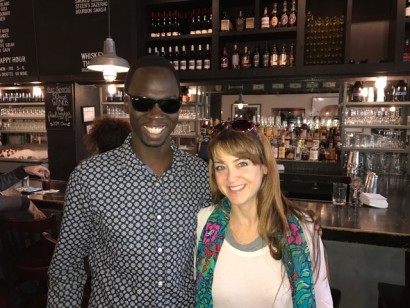Ker Deng: a Christian Survivor
by Heather Robinson

Over Memorial Day weekend, I spent a beautiful afternoon with a remarkable young man, Ker Deng, who hails originally from South Sudan.
Enslaved as a boy by a Muslim family during the most recent war between Muslims and Christians in Sudan, Ker was given the job of watching goats by his slave master. Because a goat ran away while Ker (pronounced “Keer”) was watching, his slave owner rubbed hot peppers into the boy’s eyes, hung him upside down over a fire, and blinded him.
The nonprofit organization Christian Solidarity International (CSI) ransomed Deng out of slavery.
Through CSI, Deng met Real Estate Developer Bruce Ratner and his sister, Ellen Ratner, a Fox News analyst. New Yorkers, the Ratners brought the boy, then a young teenager, to New York City and arranged for him to obtain eye surgeries that, while they have not restored his sight, have enabled him to see some shapes and color in one eye.
Ker, now a handsome man of 23 with impeccable manners and a buoyant personality, shared a bit of his story with me this week.
Because his slave master had been worried that he would escape, he had forbidden Ker to speak his native tongue, Dinka, which he relearned. Trilingual, after we ate lunch together Ker drew me into a fascinating discussion about the differences between learning English and other languages (many more homonyms in English than in Arabic or Dinka).
While the practice of ransoming Christians out of slavery at the hands of Muslims in places like Sudan is considered controversial by some, Ker speaks of it as an unqualified, unimaginable blessing. He recalled, “Christian Solidarity International has connections with leaders. If you know someone who has slaves, they will give money [for the slaves’ release.]”
He recalled his own experience on his first day of freedom: “CSI gave us food and killed a cow for celebration. They gave me shoes.”
Even after CSI arranged for his release from slavery, he and others had a long walk from Darfur, where he was enslaved, back to his home, North Bar Ghazal, in South Sudan. He recalled that one fellow Christian Sudanese, a “strong lady” who “acted like an adopted mom” helped him make it back to his town on a perilous journey on which some did not make it, including children who died from malnutrition.
He also remembers his mother, who died when he was a boy. “She always carried me, would never let go of me when we would have to walk” long distances after being captured and enslaved together.
He also told me that some of the Muslims who held Christians as slaves “punished” them for mistakes or attempts to escape by cutting off their arms and legs.
Ker’s journey to New York and his efforts to remain in the U.S. have been documented. Some time after returning to South Sudan, he and the the Ratners met. Since then, during his years in the U.S., he has testified before Congress to request residency here – a privilege which was not automatically granted to him.
It is worth noting that, at a time when the U.S. is debating opening its doors to large numbers of Arab Muslim refugees who have had the misfortune of finding themselves in a civil war in Syria, many other deserving immigrants, like Ker Deng, whose shared values and complete lack of any threat to this country are indisputable, are not automatically granted citizenship, or even residency.
More to come.
This entry was written by Heather Robinson and posted on May 27, 2017 at 9:24 pm and filed under Blog. permalink. Follow any comments here with the RSS feed for this post. Keywords: immigration, Keer Deng, South-Sudan. Post a comment or leave a trackback: Trackback URL. */?>



